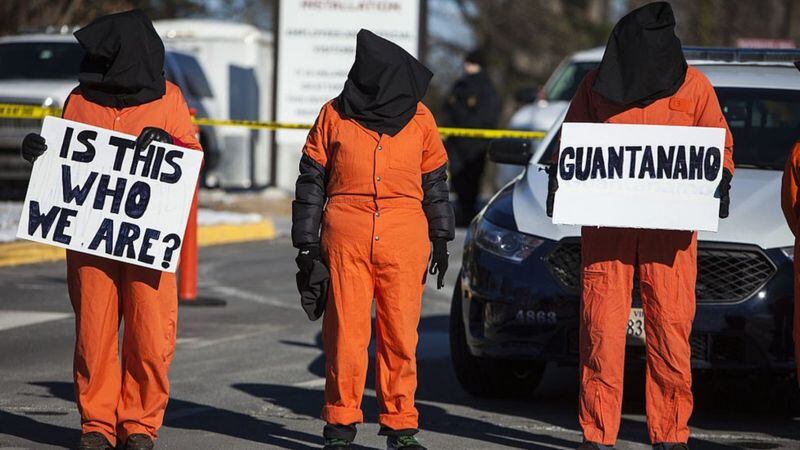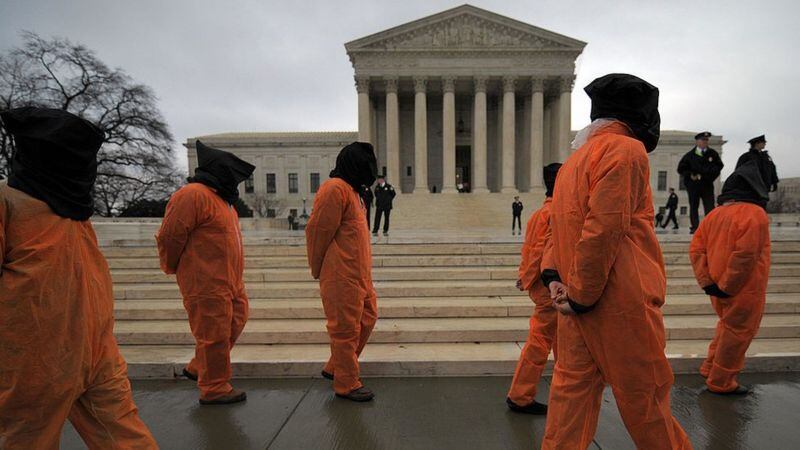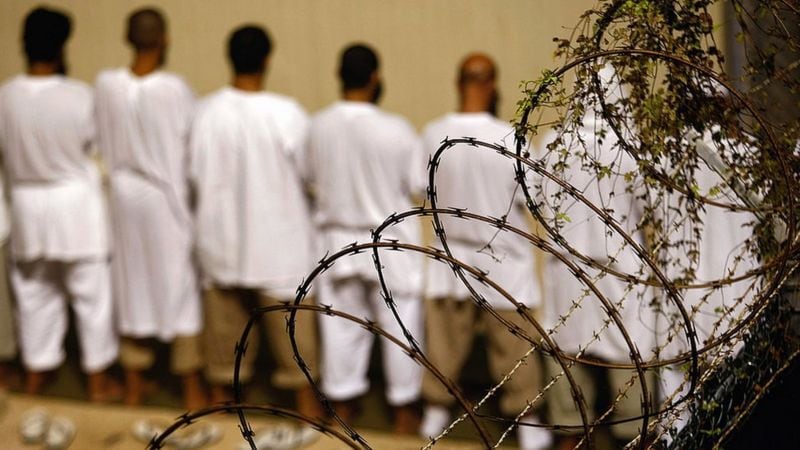“I was raped by CIA doctors.”
That was stated in a chilling 39-page account by Majid Khan, an al Qaeda member detained for nearly two decades at the US naval base in Guantánamo.
- Jury asked for clemency for detainee raped, beaten and suffocated by the CIA in Guantánamo
- Raped, beaten, hanged and suffocated: first testimony of a Guantánamo prisoner about the CIA torture
- A Guantanamo Inmate Takes CIA Tortures To The United States Supreme Courts
The man born in Saudi Arabia and raised in Pakistan was sentenced Friday to 26 years in prison after pleading guilty to aiding the Islamic fundamentalist group.
But, as part of the plea agreement, he was allowed to read a narrative of his experiences, in what constituted el first public testimony of abuses committed against a detainee following the September 11, 2001 attacks in New York and the Pentagon.
“The Americans forced an enema on me. I don’t know why they did this and the pain was terrible. They checked my body with their hands and took photos of me naked. (…) Someone put a diaper on me and fastened it with duct tape ”, he recalled in his handwritten narration.
Khan, who lived in Baltimore (USA) before being recruited by al Qaeda, assured in court that he spent days in chains, sometimes hanging, without food or clothing, in dark cells, with loud music, without access to a bathroom or electricity.
“I didn’t have access to a bathroom, not even a bucket, so I was forced to relieve myself in a corner,” he said.
Khan read his testimony before a jury of eight US military officers who deliberated for less than three hours the next day and sentenced him to 26 years from his guilty plea in February 2012.
However, the sentence is largely symbolic, since Khan and his lawyers reached a secret agreement with a senior Pentagon official whereby the man can be released as early as February 2022 and no later than February 2025, given his collaboration with the US government.
Khan admitted to working as a courier for al Qaeda and has been in custody since his capture in Pakistan in 2003.
Abuses
According to his account, the violence against him was so great that he began to tell the interrogators what they wanted to hear “so that the abuses would stop.”
But “the more I cooperated and told them, the more they tortured me,” he said.
In his narration, he claims to have been put in a tub of ice water, to have spent days in chains and received threats of possible reprisals against his family in the United States, all of which led him to states of unreality.
“After two days of being hanged, deprived of sleep and subjected to freezing temperatures, I lost my notion of reality. I remember hallucinating, seeing a cow, a gigantic lizard, ”he said.

According to his testimony, it was the repeated enemas and forced anal feeding that left the deepest marks on him.
Khan grew up in Pakistan and moved to the United States at the age of 16.
He was, he said, a “young, impressionable, vulnerable boy” when he was recruited into the organization; Now 41, he says he rejects both al Qaeda and terrorism.
Reactions
Following Khan’s sentencing, seven of the high-ranking officers who served on the military jury criticized the alleged torture he referred to.
In a letter obtained by the newspaper The New York Times In which the majority of the panel asked for clemency for Khan, the military described the actions against the prisoner as “a stain on America’s moral fiber”.
“Khan was subjected to physical and psychological abuse far beyond the approved improved interrogation techniques, which are closer to torture by the most abusive regimes in modern history,” the panel said.
The officers also considered that the abuses practiced against the inmate had “no practical value in terms of intelligence, or any other tangible benefit for the interests of the United States.”

They also condemned that Khan was imprisoned without charge for nine years and denied access to a lawyer for the first four and a half years, something they described as “total disregard for the fundamental concepts on which the Constitution was founded” and ” an affront to American values and the concept of justice ”.
The “war on terrorism”
The September 2001 attacks led the US into the longest and most costly campaign in its history: the so-called “war on terror.”
International operations, supported by allied countries and NATO, led not only to open battle fronts in various Middle Eastern nations, but also to a hunt for the main leaders and members of what the US considered “terrorist organizations.” .
Since the early 2000s, the heads of alleged members of al Qaeda, the Taliban and other extremist groups began to appear on the world’s most wanted list.
Since January 2002, the first prisoners began to arrive at Guantanamo and little by little the makeshift jail at a military base in the east of the island of Cuba was filled with some of the men considered the most dangerous in the world.

But it was not the only one: the United States began to create secret detention centers in many countries of the world, where prisoners were interrogated to obtain information about al Qaeda and potential “terrorist attacks.”
It was then that two career psychologists, James E. Mitchell and Bruce Jessen, began collaborating with the Central Intelligence Agency to devise “enhanced interrogation techniques.”
Among other techniques, in addition to simulated drowning, inmates were locked in small boxes, subjected to conditions of extreme isolation, sleep deprivation, dietary manipulation, forced nudity, or rectal abuse.
- COP26: world leaders under pressure to face the climate emergency
- “5 million deaths from COVID-19 is a great wake-up call for all humanity”
- US Prosecutor’s Office asks to dismiss 7 of the 8 money laundering charges against Álex Saab
- Who is José Antonio Kast, the defender of the Pinochet legacy who is very close to the presidency of Chile?
- Members of the jury asked clemency for detainee tortured by the CIA
.

:quality(75)/cloudfront-us-east-1.images.arcpublishing.com/elcomercio/WDVEUIR6CRACRG7NDIYFI5OTBE.jpg)

:quality(75)/cloudfront-us-east-1.images.arcpublishing.com/elcomercio/FLNG4LKWINF3POY2UYWN5ZB3SI.jpg)
:quality(75)/cloudfront-us-east-1.images.arcpublishing.com/elcomercio/WALJ6KER2VGHTFHGUQWVRCZR7A.jpg)
:quality(75)/cloudfront-us-east-1.images.arcpublishing.com/elcomercio/PNHCCWBID5HAZEHDRKZP2P5RWI.jpg)

